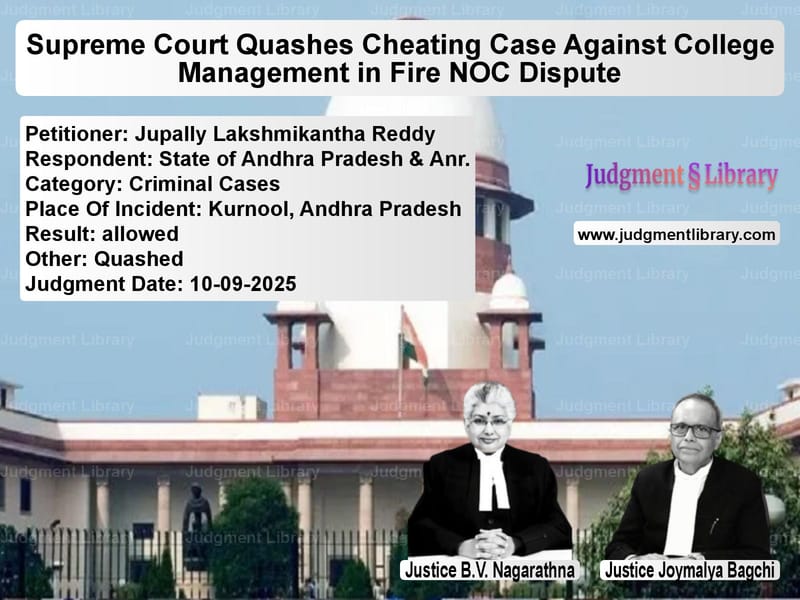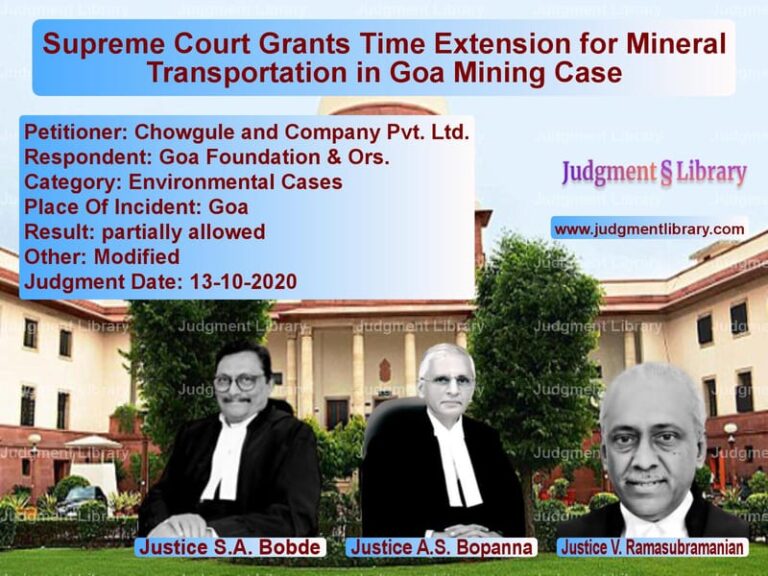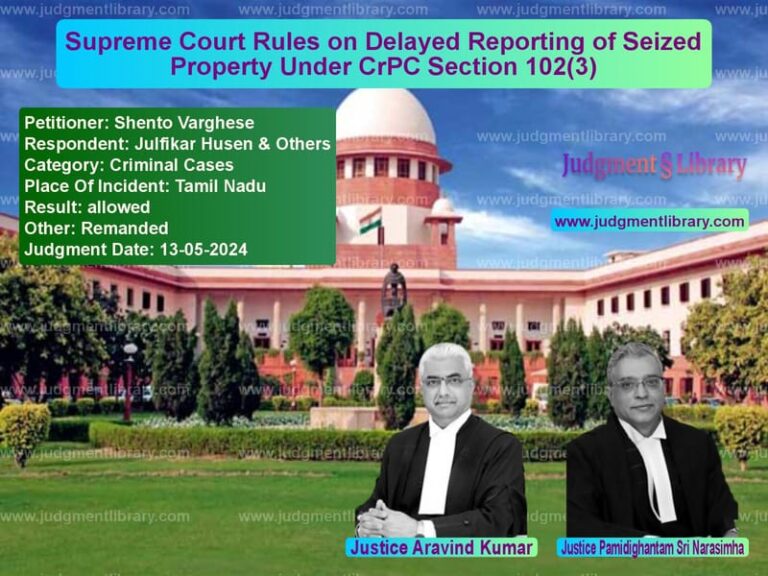Supreme Court Quashes Cheating Case Against College Management in Fire NOC Dispute
In a significant ruling that clarifies the essential ingredients of the offence of cheating, the Supreme Court has quashed criminal proceedings against an educational society and its management accused of using a forged No Objection Certificate from the Fire Department. The case involved Jupally Lakshmikantha Reddy, who challenged the Andhra Pradesh High Court’s refusal to quash proceedings against him under Section 420 of the Indian Penal Code.
The controversy began when JVRR Education Society, running a college since 2016 from a building with a height of 14.20 metres, was accused of obtaining a recognition certificate from the School Education Department by submitting a forged NOC from the Assistant District Fire Officer, Kurnool. On July 13, 2018, V. Sreenivasa Reddy, the District Fire Officer, filed a written complaint alleging that the college had submitted a forged document to obtain recognition. This led to the registration of FIR No. 99/2018 at Nandyal III Town Police Station under Sections 420, 465, 468, and 471 of the IPC.
After investigation, a chargesheet was filed specifically under Section 420 IPC, alleging that the appellant had created a forged NOC document and used it as genuine to play fraud on the Education Department and District Fire Office. However, a crucial fact emerged during the proceedings – according to the National Building Code of India, 2016, an NOC from the Fire Department was not necessary for educational buildings below 15 metres in height. Since the appellant’s building stood at 14.20 metres, no such certificate was legally required.
This factual position had already been established in earlier writ proceedings. The appellant’s society, along with other educational institutions, had filed WP No. 14542/2018 before the High Court, praying for renewal of affiliation without insisting on fire NOC. The High Court had allowed this petition on April 25, 2018, directing the Education Department to renew affiliation without requiring fire NOC. When this direction wasn’t complied with, contempt proceedings were initiated against both the Education and Fire Departments.
The appellant contended that the criminal case was registered as a “counter-blast” to intimidate and harass him for pursuing legal remedies against the departments. Despite this background, the High Court refused to quash the proceedings, holding that the issue of whether the NOC was necessary couldn’t be considered at the preliminary stage.
Before the Supreme Court, Mr. Sridhar Potaraju, learned senior counsel for the appellant, argued the case, while Ms. Prerna Singh represented the respondents. The Supreme Court bench comprising Justices B.V. Nagarathna and Joymalya Bagchi delved deep into the legal requirements for establishing the offence of cheating.
The court began by examining the essential ingredients of cheating under Section 415 IPC, which requires: “1) Deception of a person by making false representation which the maker knows or has reason to believe is false and thereby 2) (a) Fraudulently or dishonestly inducing such person: (i) to deliver any property to any person, or (ii) to consent that any person shall retain any property, or (b) Intentionally induces that person to do or omit to do anything which he would not do or omit if he were not so deceived, and which act or omission causes or is likely to cause damage or harm to that person in body, mind, reputation or property.”
The court further analyzed the definitions of “dishonestly” and “fraudulently” under Sections 24 and 25 IPC. “Dishonestly” means doing anything with the intention of causing wrongful gain to one person or wrongful loss to another, while “fraudulently” means doing something with intent to defraud.
The judges made several crucial observations about the legal requirements for establishing cheating. Quoting from Dr. Sharma’s Nursing Home v. Delhi Admn. & Ors., the court stated: “…both the learned courts have rested their findings on deception only and did not go into the question whether the complaint and its accompaniments disclosed the other essential ingredient of the offence under Section 420 IPC, namely, dishonest inducement. ‘Dishonesty’ has been defined in Section 24 IPC to mean deliberate intention to cause wrongful gain or wrongful loss; and when with such intention, deception is practised and delivery of property is induced then the offence under Section 420 IPC can be said to have been committed…”
The court further elaborated on the distinction between different types of inducement under Section 415: “In Hridaya Ranjan Prasad Verma & Ors. v. State of Bihar & Anr., this Court reiterated that Section 415 IPC contemplates two distinct situations; the first where a person is dishonestly induced to deliver property, and the second where a person is induced to do or omit an act which, but for the deception, he would not have done or omitted. In the former, the inducement must be fraudulent or dishonest, whereas in the latter it need only be intentional. Therefore, intention is the gist of the offence.”
Applying these legal principles to the facts of the case, the Supreme Court made a significant finding: “Uncontroverted allegations in the charge sheet including the order in the writ proceedings, unequivocally show NOC from the Fire Department was not necessary for grant of such recognition/renewal of affiliation as the height of the appellant’s building was below 15 metres. Given this situation, the representation of the appellant that he possessed a valid NOC cannot be said to have induced the Education Department to grant recognition or renew the affiliation.”
The court emphasized the essential legal requirement: “To attract penal consequences, it must be shown that the false representation was of a material fact which had induced the victim to either part with property or act in a manner which they would not otherwise do but for such false representation. In the absence of such vital link between the alleged false representation and the issuance of recognition/renewal of affiliation, the essential ingredient of offence is not satisfied.”
The court also addressed Ms. Prerna Singh’s argument that though the chargesheet was filed under Section 420, the contours of forgery were evident as the appellant had knowingly used a fake document. The judges rejected this submission, stating: “There is nothing on record to show the appellant had manufactured the alleged fake document which is a sine qua non to attract Section 465 IPC. In fact, the original fabricated document had not been recovered.”
Citing Sheila Sebastian v. R. Jawaharaj & Anr., the court noted: “…to attract Section 464 IPC, the prosecution must establish that the accused had made the fake document. No material connecting the appellant to the making of the fake document has been adduced in the impugned charge sheet.”
The court further observed that offences under Sections 468 and 471 IPC were not attracted either, as “the requisite mens rea, i.e., dishonest intention to cause wrongful loss to the Education Department and wrongful gain to himself has not been demonstrated as the issuance of the recognition was not dependent on the production of the alleged forged NOC.”
The Supreme Court concluded that the High Court had failed to consider these relevant issues which clearly demonstrated that the uncontroverted allegations in the chargesheet, particularly in light of the order in the writ proceedings, did not disclose essential ingredients of cheating or forgery. Accordingly, the court set aside the High Court’s order and quashed the proceedings in CC No. 303/2020 under Section 420 IPC.
This judgment serves as an important precedent in criminal law, emphasizing that mere deception by itself does not constitute cheating unless the other essential ingredient of dishonest inducement is established. The ruling clarifies that for an offence of cheating to be made out, there must be a direct causal link between the false representation and the action taken by the victim, and that the representation must be about a material fact that actually influences the decision-making process. The decision also reinforces the principle that criminal law should not be used as a tool for harassment when essential ingredients of offences are not made out from the uncontroverted facts of the case.
Petitioner Name: Jupally Lakshmikantha Reddy.Respondent Name: State of Andhra Pradesh & Anr..Judgment By: Justice B.V. Nagarathna, Justice Joymalya Bagchi.Place Of Incident: Kurnool, Andhra Pradesh.Judgment Date: 10-09-2025.Result: allowed.
Don’t miss out on the full details! Download the complete judgment in PDF format below and gain valuable insights instantly!
Download Judgment: jupally-lakshmikanth-vs-state-of-andhra-prad-supreme-court-of-india-judgment-dated-10-09-2025.pdf
Directly Download Judgment: Directly download this Judgment
See all petitions in Fraud and Forgery
See all petitions in Other Cases
See all petitions in Judgment by B.V. Nagarathna
See all petitions in Judgment by Joymalya Bagchi
See all petitions in allowed
See all petitions in Quashed
See all petitions in supreme court of India judgments September 2025
See all petitions in 2025 judgments
See all posts in Criminal Cases Category
See all allowed petitions in Criminal Cases Category
See all Dismissed petitions in Criminal Cases Category
See all partially allowed petitions in Criminal Cases Category







